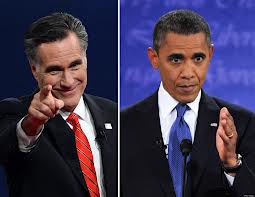Mitt Romney is back in the news with more than a little schadenfreude, talking about how he would be better not only to deal with sequestration but also with Iran. Or so he claims. But had he become president, it would have been interesting to see the Romney Doctrine in action—a foreign policy lodestar distinctly different from the Obama Doctrine.
Normally foreign policy experts talk in terms of grand strategies—sets of guiding principles for an administration’s foreign policy—but occasionally in the world of ideas a particular set of strategic principles gets defined as a doctrine. Here, for example, is something I published a couple of elections ago on the Palin Doctrine.
But in reality there is no clear process by which this occurs, nor any specific criteria that a certain set of principles must meet to get deemed a “doctrine.” A general rule of thumb holds that a leader’s strategic outlook must be a sizable departure from his or her predecessors’ and internally consistent. Once someone in the media uses a term like “the Bush Doctrine,” thereafter a tipping point may be reached in the public sphere when, voila, the world has a new doctrine on its hands.
Although once the Bush Doctrine emerged, in light of the controversy kicked up by preemption and the high cost of two less than fully necessary wars, it now appears that each successive President may get a doctrine named for him. That said, both Romney and Obama’s foreign policy principles represent a sizable departure from what preceded them.
The Romney Doctrine would more than likely have been comprised of three fundamental principles: significantly increasing defense spending; giving a free hand to staunch American allies; and pursuing an aggressive posture toward rivals around the world. In terms of radicalism it would have rivaled even the Bush Doctrine’s notorious trinity of unilateralism, preemption, and regime change.
During the campaign Romney rejected any notion of American decline with all the swagger of the title of his book, “No Apology.” He pledged to maintain the U.S. position as sole global superpower, including thwarting the rise of China and cutting down Russia still further to size, as well as remaining in Iraq and Afghanistan indefinitely. In the era of the Arab Awakening he proposed to outsource U.S. policy on Middle East peace to the Israeli Prime Minister, whom he would have given a green light to bomb Iran.
By contrast the Obama Doctrine is essentially comprised of robust burden sharing, a kind of uni/multi-lateralism involving a general tendency to rely partly on allies to achieve America’s interests and partly on itself should a given situation require using robust or rapid force. However, use of force should be tempered by practical limits and a healthy sense of how strategic partnerships can be leveraged to meet U.S. national interests where possible. In short, it prescribes a foreign policy of being multilateral when we can, unilateral when we must.
From the moves to eliminate Osama bin Laden in Pakistan and rescue Captain Richard Phillips from Somali pirates, to giving space for European partners to spearhead the successful NATO operation in Libya and working with Israel to engage in cyber warfare against Iran, the Obama Doctrine is unique in attempting to reconcile unilateral and multilateral tendencies that are normally viewed as working at cross purposes with one another.
During his first campaign, experts did not take candidate Obama seriously when he pronounced he would be willing to intervene in Pakistan without its permission. When the new President appeared to win the Nobel Peace Prize prematurely, he spent his Nobel acceptance speech laying out the principles for waging necessary war. After four years of increased reliance on drones in Afghanistan and Pakistan inter alia, experts have reevaluated.
If the Obama Doctrine is fundamentally pragmatic, the wouldbe Romney Doctrine is inherently expansionist. Where the Obama Administration in strategic terms appears to be managing relative U.S. decline, Romney has decried this as sacrilege. While Romney would have been forced to grapple with the same limits on American influence as the President, we could have expected fundamental changes in the conduct of U.S. foreign policy—at least initially.
Or could I be wrong? When President John Quincy Adams was Secretary of State under James Monroe he famously declared that America “goes not abroad in search of monsters to destroy,” offering diplomatic support to independence movements instead of armed intervention.
Polling trends suggest Americans have grown tired of being the albatross astride the globe slaying monsters. Perhaps the complexities of an increasing unstable world do not offer the victorious candidate a clear Adams style choice.
As President Obama has had to be more unilateralist than we expected he would be, perhaps a President Romney would have ended up being more multilateralist than expected. In his clarion call for a more muscular America on the world stage I believe he was sincere. But would the world have allowed him to stick to his, er, guns?
Dr. Jeffrey A. Stacey is currently Managing Partner of Geopolicity USA, an overseas development firm. Formerly he was Senior Fellow at the Center for Transatlantic Relations at SAIS, before which he served in the Obama Administration as a State Department official specializing in NATO and EU relations at the Bureau for Conflict Stabilization Operations. At State he founded and managed the International Stabilization and Peacebuilding Initiative (ISPI), which has over 20 government and international organization partners.
Dr. Stacey is the author of "Integrating Europe" by Oxford University Press and is currently working on a follow-up book entitled "End of the West, Rise of the East?" He has been a guest blogger at The Washington Note and Democracy Arsenal, a professor of U.S. foreign policy at Tulane University and Fordham University, a consultant at the Open Society Institute and the U.S. Institute of Peace, and a visiting scholar at George Washington, Georgetown, and the University of California. He received his PhD from Columbia University.



0 Comments